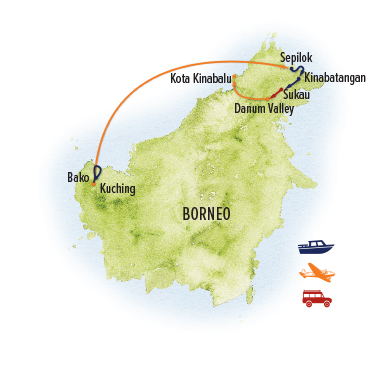2025 & 2026 Itinerary — 13 Days
Our adventure begins in Kuching, the capital of the East Malaysian state of Sarawak and the largest city on the island of Borneo. Kuching is one of the most multicultural cities in Malaysia, melding Chinese, Malay, Indian and Indonesian cultural groups and languages. Transfer to our 5-star hotel in the city center and have lunch, then visit Semenggoh Orangutan Center to observe the afternoon feeding. The center provides some of the best opportunities for close-up orangutan photography. It was established in 1975 to care for wild animals found injured or orphaned in the forest, or ones that were previously kept as illegal pets. Since its founding, the center has cared for more than 1,000 animals, and its orangutan rehabilitation mission has been so successful that the surrounding reserve has now reached its carrying capacity. While rehabilitation continues elsewhere, today Semenggoh focuses on the study of orangutan biology and behavior while providing a safe and natural haven for dozens of semi-wild orangutans that are graduates of the rehab program. It is also home to numerous babies, born in the wild to rehabilitated mothers, a further testament to the program's success. This evening, learn more about the adventures to come at a welcome dinner with our Expedition Leader.
Day 2: Bako National Park
Embark on a short boat ride this morning to Bako National Park, reachable only by sea on the tip of a peninsula where the Bako and Kuching rivers meet. Millions of years of erosion have carved the sandstone cliffs and rocky headlands into fantastically shaped arches, striated with colored layers formed by iron deposits. White sandy beaches edge the coast below, while inland, the compact reserve abounds with wildlife. Photograph proboscis monkeys in the trees, along with long-tailed macaques, silvered leaf monkeys and numerous tropical bird species. A walk along the lush mangrove trails may also reveal smooth-coated otters and Bornean bearded pigs. Though Bako is one of the smallest national parks in Sarawak, its multiple biomes harbor a great diversity of species. Bring lenses for both landscape and macro shots as we explore rainforest, jungle streams and secluded beaches along a network of trails, before returning to Kuching.
Day 3: Sandakan / Kabili-Sepilok Nature Reserve
This morning, fly to Sandakan, Sabah. Our destination is the Kabili-Sepilok Forest Reserve, home to endangered orangutans. The 10,000-acre protected area, named for the two main rivers that flow through it, comprises tropical highland forest, sandstone ridges and lowland mangrove swamp. In addition to orangutans, search the forest for gibbons, macaques, mouse deer, wild boar and bright-colored kingfishers. We stay on the very edge of the reserve surrounded by huge trees and lush tropical plants. This afternoon we visit the Rainforest Discovery Center, an environmental education center run by the Sabah Forestry Department, to learn more about our intensely biodiverse environment. Explore the Plant Discovery Garden and get a look at life high in the canopy on an elevated walkway more than a third of a mile long. The area has been declared an Important Bird Area (IBA) and is often the host for the Borneo Bird Festival, which draws birders from around the world. After dark, head into the forest on a guided night walk to hear and see an array of nocturnal creatures.
Day 4: Sepilok Orangutan Sanctuary / Private Tour of Sun Bear Conservation Center
Make two visits today to Sepilok Orangutan Rehabilitation Center, established in 1964 to protect orphaned baby orangutans and rehabilitate them for return to the wild. We go early to photograph the orangutans' morning feeding, then return for their afternoon feeding. Most orphans were seized from illegal captivity after having been taken from their mothers as infants to be kept as pets. Staff help them learn basic survival skills such as how to find food, build nests and climb trees. The center also aids adults that have sustained injuries or require medical care before being returned to their natural habitat. Since the center was established, more than 100 orangutans have been successfully released. Its mission has grown to include research, conservation education and support for other endangered species. During our visit we'll get close-up photos of the orangutans, learn about the rehabilitation process, and hike on boardwalks through the rainforest as we watch youngsters swing from vines to feeding areas where they receive their daily fruit and milk. Keep an eye out, too, for long- and pig-tailed macaques leaping through the treetops.
Next, we visit the Bornean Sun Bear Conservation Center. Founded in 2008, the center provides care, rehabilitation and release of orphaned and captive sun bears, and increases awareness about the plight of this little-known bear. Our private tour of the center is either with founder Wong Siew Te, whom CNN lauded as a Hero of 2017, calling him a “Superman saving the sun bears of Malaysia,” or one of his close conservation colleagues. The Malayan sun bear, found only in Southeast Asia, is the world’s smallest bear species. While Borneo remains a stronghold for this vulnerable animal, it is seriously threatened if not extinct in many areas of mainland Asia, where forest destruction and poaching have dramatically reduced its numbers.
Day 5: Labuk Bay Proboscis Monkey Sanctuary / Kinabatangan Wildlife Sanctuary
This morning we visit Labuk Bay Proboscis Monkey Sanctuary, a coastal mangrove reserve that offers a close-up view of these leaping primates named for their large, fleshy noses—and which are found nowhere outside Borneo. Then depart by boat for the dense mangrove forests of Kinabatangan Wildlife Sanctuary. The Kinabatangan River at the center of the reserve is the longest river in Sabah, providing a lifeline for inhabitants of this vital ecosystem. Our remote jungle lodge along the riverbank is inaccessible by road, offering exceptional privacy and solitude. Take guided nature walks in the surrounding rainforest and cruise up the Kinabatangan River by day and at dusk to see, hear and photograph nocturnal creatures such as crocodiles and night birds. A hike on the boardwalk behind the lodge offers chances for birding and macro photography. There are no villages for miles, and the only human presence is a few local shrimp fishermen on the river, whose catch often provides a fresh dinner at the lodge.
Day 6: Kinabatangan Wildlife Sanctuary
Kinabatangan Wildlife Sanctuary is home to one of the highest animal concentrations in Southeast Asia, in an area where human population is unusually sparse—we’ve thus devoted a whole day here to pursue outstanding wildlife photography opportunities. Lush vegetation provides camouflage for many species, but we'll hope to see and photograph plenty of the wild residents including the elusive orangutan, proboscis and leaf monkeys, gibbon, macaque, pygmy elephant, wild boar, otter, river crocodile, monitor lizard and a great array of birdlife—rhinoceros hornbill and kingfisher are common sightings. Since palm oil plantations surround the reserve on all sides, it provides especially critical habitat for these species threatened by habitat loss. A special focus today is macro photography, with numerous enticing small subjects among flora and fauna alike.
Day 7: Kinabatangan River Cruise / Sukau
After breakfast, we board a boat for a 90-minute cruise up the Kinabatangan River to Sukau Rainforest Lodge, surrounded by some of the very best wildlife photography opportunities in Borneo. As we travel upstream, we notice the vegetation around us changing from swampy mangrove habitat to lowland rainforest. On arrival, we have lunch and check in to our deluxe jungle villas, then cruise the river in search of more wildlife along the banks—the Sukau region offers our best chance to photograph pygmy elephants, as we are in the very heart of their range. Plenty of animals live in close vicinity to the lodge, and we often see orangutans, proboscis monkeys, silvered leaf langurs and macaques on the property. We return in time for dinner, then head into the forest on a night walk with our Expedition Leader.
Day 8: Sukau—Sunrise River Cruise / Gomantong Caves
Wake before dawn for coffee and a snack before departing on a sunrise river outing, as the birds and other rainforest creatures are waking up. Return to the lodge for breakfast, then take a walk with our Expedition Leader on trails around the lodge to search for orangutans, proboscis monkeys, silver leaf langurs, colugos and more. After lunch, depart for Gomantong Caves, which we reach via a short boat ride and drive to arrive at the forest reserve. A resident orangutan population lives near this vast cavern system, and we keep an eye toward the trees in hopes of capturing photos of them.
After we explore the main cave chamber, it’s time to prepare for Gomantong’s most famous phenomenon: the nightly mass bat exodus at dusk. We witness it at eye level from a new boardwalk and viewing platform strategically positioned near the top of the cave. It’s an exciting vantage point, as we also get close-up shots of the feeding frenzy by birds of prey picking off bats as they fly out of the cave. Wallace's hawk eagles, bat hawks, and occasionally pied hornbills wait to hunt them in mid-air as hundreds of thousands of bats exit the cave chamber. Return to the lodge for dinner, then take a night cruise to photograph nocturnal wildlife along the riverbanks.
Days 9–11: Sukau / Danum Valley
Rise early to leave the Kinabatangan region, driving on a logging road through the nearest town, Lahad Datu, then on to Borneo Rainforest Lodge within the Danum Valley. Danum Valley Conservation Area is Sabah's largest area of undisturbed lowland forest, with more than 200 species of trees that tower to 160 feet. This spectacular tract of ancient primary rainforest holds exceptional status. Before it received full protection in 1995, there were no human settlements within the area, meaning that hunting, logging and other human activities had not disturbed the habitat. Danum Valley is one of the planet's most complex ecosystems, containing an astoundingly diverse array of flora and fauna, including clouded leopard, orangutan and proboscis monkeys. Amid dense vegetation, follow elevated walkways through the canopy and hike a network of trails that surrounds our secluded lodge. On night drives in open safari vehicles, watch and listen to the rainforest’s inhabitants become animated after dusk.
Danum Valley is one of the planet's most complex ecosystems, containing an astoundingly diverse array of flora and fauna, including clouded leopard, orangutan and proboscis monkeys. Amid dense vegetation, hike a network of trails and follow elevated walkways through the canopy. Rise early for a sunrise shoot at a watch tower, capturing mist drift across the rainforest canopy during the golden hour. After full days of photo shoots in the jungle, our Expedition Leader offers photo workshops and post-processing assistance back at our secluded lodge. On night drives in open safari vehicles, watch and listen to the rainforest’s inhabitants become animated after dusk.
Day 12: Danum Valley / Lahad Datu / Kota Kinabalu
This morning, enjoy an easy nature hike or birdwatching on the canopy walkway before we depart. Here in the treetops we may be able to get photos of great slaty woodpeckers, black-and-red broadbills and giant pittas among a multitude of species. Then transfer by road to Lahad Datu, where we depart by plane for Kota Kinabalu, capital of Malaysia’s Sabah state in the northern part of Borneo. This coastal city, partly surrounded by rainforest, is known for its classic markets, modern boardwalk, beaches and lively waterfront. Our Borneo adventure comes to a close this evening with a farewell dinner.
Day 13: Kota Kinabalu / Depart
Transfer to the airport this morning for homeward flights.
























